Here are the most notable items the BikePortland community came across in the past seven days.
Note: In light of our 15th anniversary, I want to point out that BikePortland has delivered this weekly roundup of important stories to you for the past 552 weeks. Since 2008! Thank you to our subscribers and supporters for making this possible.
Opportunity: Columnists and planners worldwide are urging cities to seize the day when it comes to changing our streets to reflect the new reality — or doing it because we can have a different reality when the virus recedes.
Racial disparities: There’s growing discussion about how calls for street changes ignore/exacerbate/impact existing racial discrimination. We cannot forget basic principles of mobility justice and the lived experiences of black, indigenous and people of color when we talk about how streets are planned and used.
Bias against people without cars: On March 13th we wondered when a city would discriminate against people for not being inside cars when it came to lining up for pandemic-related services. About three weeks later we got our answer: a city in Florida sternly advised people that not inside a car would not be served.
Bike-thrus in Seattle: An advocacy effort to ensure drive-thru access to people not using cars and partly inspired by Portland has sprung up in Seattle.
The next phase: “Our response [to transportation] requires both immediate solutions, and preparation for a long fight,” says this well-reasoned opinion piece from Canada that advises cities to lean on existing plans and reminds us bike infrastructure projects create more jobs than car/road projects.
Mask advice: Bicycling can help you understand the why and how of wearing a mask while riding.
Advertisement
“Essential” bike shop? If a bike shop caters to high-end and competitive cycling enthusiasts they aren’t “essential” in the same way more service-oriented neighborhood-serving bike shops are.
Give us more lanes! Clark County drivers are eager for Oregon to widen freeways, environmental review be damned.
Cycling docs to watch: Need content for your indoor training rides? Here are 15 of the best cycling documentaries on YouTube according to CyclingTips.com.
Infrastructure stimulus: State DOTs are asking for $50 Billion in stimulus funding as part of an estimated $800 Billion infrastructure bill floating around Capitol Hill.
Reframing transit: The success of transit isn’t about ridership numbers, it’s about providing a basic and essential service argues Jarrett Walker.
Advertisement
Budapest gets it: “The decrease in automobile traffic provides an opportunity to improve Budapest’s bicycle transport network with rapid intervention,” says an official statement from the capitol of Hungary.
Berlin gets it: This Amazing photo gallery shows how quickly the German city has changed streets to give bicycle users more space.
East London gets it: After crowd-sourcing ideas on social media, a neighborhood council will use simple diverters to block through driving access on some streets to increase safety and space for walkers and bicycle riders.
Boston, Minneapolis, Oakland, too: NY Times has a solid nationwide roundup of cities that have responded to the virus-outbreak with major street changes.
Car sales way up China: We can either seize this once-in-a-generation opportunity to create healthy streets or we can wait until the impending driving boom makes it even harder.
Video of the Week: A brilliant way to explain the need for more street space in the time of social distancing:
— Jonathan Maus: (503) 706-8804, @jonathan_maus on Twitter and jonathan@bikeportland.org
— Get our headlines delivered to your inbox.
— Support this independent community media outlet with a one-time contribution or monthly subscription.



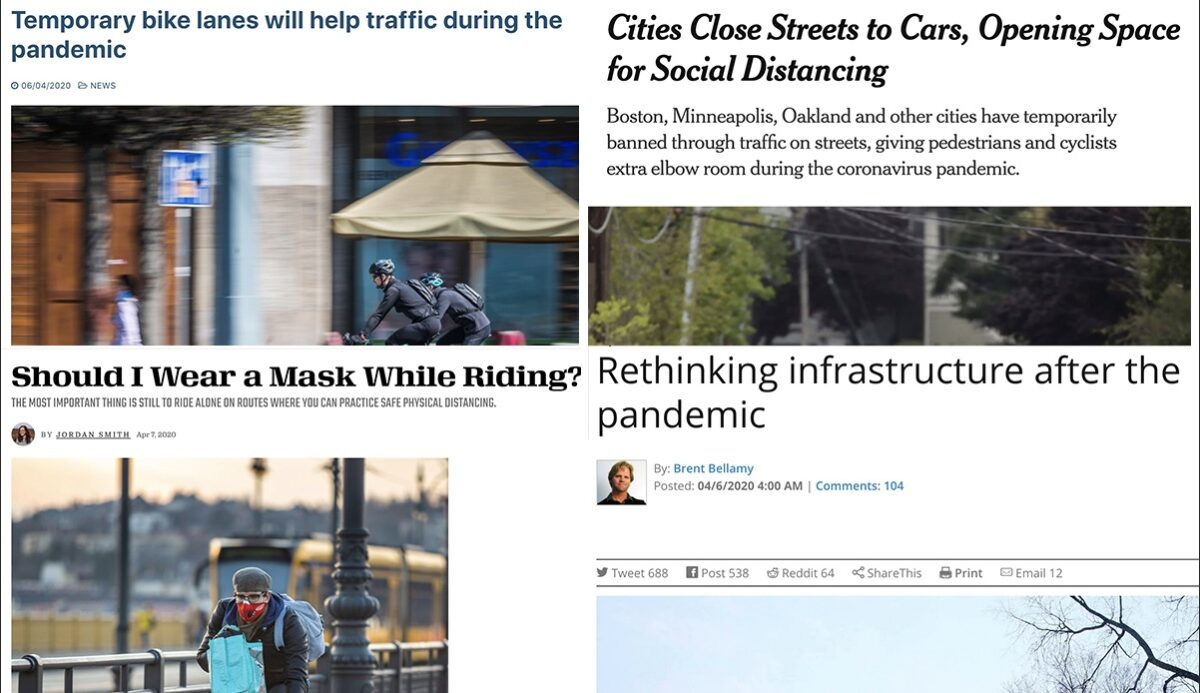
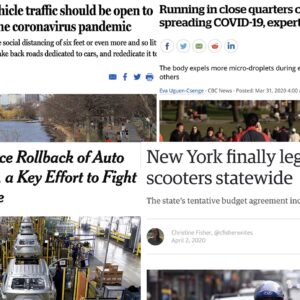
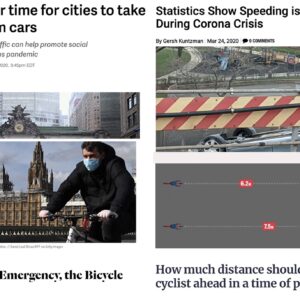
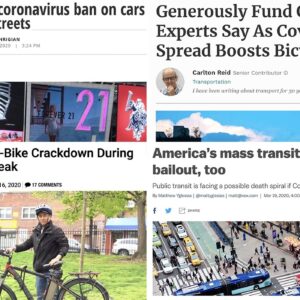
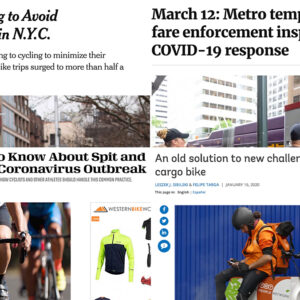
Thanks for reading.
BikePortland has served this community with independent community journalism since 2005. We rely on subscriptions from readers like you to survive. Your financial support is vital in keeping this valuable resource alive and well.
Please subscribe today to strengthen and expand our work.
More “tail wagging the dog” from The Columbian. Nobody is forced to work here and live in SW WA; its a choice, and the consequences of that choice should not be foisted upon those who make what I consider a wiser choice, to live close to where they work. Without freeways people would do just that!
Why do portland employers keep hiring “those people” from across the river?
You are the only person asking this question. Why?
Seems like the simple solution would be to hire local, and therefore reduce the commutes. Perhaps some incentives would help with that policy.
As required by Oregon law, the City of Portland provides incentives to walk, bike and take transit.
Perhaps you mean home purchase assistance? Like below market loan rates?
The costs to not live in Portland are borne by those that choose not to do so, as are the benefits.
Clark county commuters are doing nothing wrong. They are spending money here and paying taxes here. If there was not a bridge, it would just be a normal commute.
MORG, you should change your moniker to “Beside the Point Guy,” since much of what you say is beside the point.
You well know (or should know) that warped transportation policy has gotten us where we are today, at the point where someone who buys a house in Battleground is subsidized to the tune of hundreds of millions of dollars for making that choice, and then people like The Columbian (and you) argue that’s not just the way things are – it’s the way things oughta be!
Every driver from WA should pay for impact caused by that choice – as should we all, whenever we drive anywhere. But no – you want a free ride.
Perhaps people can stop complaining about them, then. They’ve done nothing wrong.
Choosing to burn an excess amount of fossil fuel is indeed doing something wrong. Did you just wake up from a 100-year coma or something?
What constitutes an “excess amount”?
Ugh. There are none so blind as those who will not see. I’m so sick of your shenanigans.
Yours is an unfair criticism; I am not blind to the consequences of using fossil fuels, but I do find vague moral admonitions unhelpful. If you declare it wrong to use an “excess” of fossil fuels, it would be helpful to understand what that actually means. Is it wrong to drive? To heat your house? To use electricity? To burn a pile of coal in your backyard because you like the look of glowing embers?
What is the behavior you actually think is wrong?
Please get a fuggin life.
The Columbian’s Editorial is so insanely dumb (but perfectly on-brand) I almost don’t know where to start.
Clearly, it starts with the assumption that climate change is not real or at least not eminent. But the last line is so myopic it almost reads like a joke ” Washington residents would pay a disproportionate percentage of any tolls near the state line; we should share in the benefits from those payments.”
uhhh, how about 1: not having continuous traffic jams all day due to tolling induced demand-shifting? or 2: not killing the planet more? 3: encouraging alternate modes which are more efficient? or 4: not wasting $700 million on another freeway expansion? I think it is funny how conservatives get all riled up when deficit spending goes to anything other than roads, tax-breaks or the military industrial complex- “Our grandkids are gonna pay for this though higher taxes… eek!!”
Without freeways, there would also be a lot fewer employers and a lot fewer out-of-staters moving to Oregon. Both of which would lower the traffic and pollution levels.
Without freeways, we don’t actually know what the world would be like. There’s a strong likelihood it would be better.
You are invoking the classic fallacy of arguing that the current situation is not just better – it’s inevitable. But it’s not: it’s the result of choices we have made, meaning we can choose differently in future.
Aren’t these the folk who voted against extending Light Rail across the river years ago when the Yellow line was being planned out?
“If a bike shop caters to high-end and competitive cycling enthusiasts they aren’t ‘essential’ in the same way more service-oriented neighborhood-serving bike shops are.”
Sounds right to me.
Sometimes they are one in the same. If I choose to commute to MY essential job on my “nice” bike I won’t be hitting up City Bikes for a service issue. Sellwood and RCB are great examples of how incorrect you are. Those folks need to make a living too. Enjoy your masks!
A tube is a tube, a patch kit is a patch kit. Proximity matters for some of us.
The linked article under the “Racial disparities” item might not be the intended link — it doesn’t mention mobility justice.
Thanks Josh. Sorry about that. Meant to link to this http://www.untokening.org/updates/2020/4/8/mobility-justice-and-covid-19
“Do not plan future projects at a time when equitable public participation is impossible.”
Does this mean bike projects, rose lanes, et al should be on hold until this blows over? I mean, this is essentially what Eudaly has been saying, right?
Yet Metro just rubber-stamped the I-5 expansion, which blows away the pittances we’ve been asking for by several orders of magnitude.
Kind of makes you wonder how they’ll spend that transportation bond money they’re going to ask us for, doesn’t it?
From the Columbian article:
“In the case of a freeway expansion, an increase in carbon emissions, air pollution and noise pollution can have deleterious effects. But such (Environmental Impact) reviews too frequently are used by opponents who are more interested in halting or delaying a project out of principal than they are in public health.”
This is a weirdly contradictory and disingenuous statement. First off, in this case, I think public health sort of IS the principal. Secondly, the list of deleterious effects that are rattled off and seemingly dismissed with a shrug are exactly what reviews are for. What’s at issue is we don’t all agree as to whether we ought to actually give a shit about things like that.
I am willing to bet that if there was no public health impacts, the same “cons” would still be against it.
Please describe a scenario where there are no public health impacts associated with widening a freeway. It sounds fantastic, in the truest sense.
I can see a scenario in which the community benefits of a hypothetical project, such as capping, adding barrier-protected 2-way bike lanes on each side of a roadway, adding sidewalks, public art, and new community amenities could actually outweigh the net detrimental effects of widening a freeway. I-90 at Mercer Island in the 90s for example, or the Big Dig in Boston. Both projects were expensive, and one can argue that the money would have been spent better elsewhere or in other ways, but that’s not really your question, is it?
No, my question is pretty simple. Is there really any such thing as a freeway expansion that has zero impact on public health?
My understanding is that an EIS is meant not to determine whether there’s an environmental/health impact associated with a project, but to estimate or predict the extent of that impact.
Oh, you mean an EIS? Well, that’s completely different. I thought you meant general public health impacts.
An EIS is typically done where any road project, be it a freeway or a bicycle boulevard, goes through any neighborhood that is both poor and predominantly African-American. Keep in mind the EIS legislation was written in the late 1960s as part of Johnson’s Great Society legislation, to keep highway projects from negatively impacting poor black neighborhoods, so other races and ethnic groups didn’t matter at that time. If the neighborhood(s) impacted is no longer poor and blacks now live elsewhere (such as in Portsmouth or Powellhurst-Gilbert), then an EIS is very unlikely to be required at all by the Feds, no matter how impactful the resulting pollution might be. Similarly, if PBOT wants to put in a bicycle facility through a predominantly black neighborhood (such as on NE 7th/9th), and there’s pushback by the black neighbors there, then PBOT would also need to do an EIS, which would likely cost more than the project itself.
Possible example of a “highway” project with “positive” environmental outcomes…Seattle’s tunnel conversion of the Alaska Viaduct?
A widened freeway will provide more room for idle young people (mainly young men) to stop traffic and do donuts.
I’m simply saying that people will hide behind a reason. Remove that reason and they will find another.
It usually comes down to “I just don’t like it”, rather than a rational argument.
So if that bridge had a net result of no pollution and caused no congestion, would you be against it?
It would still be a waste of money.
Waste of money is a personal interpretation. Some folks feel the same way about bike infrastructure.
If the bridge did not add pollution (local or global), did not worsen congestion, and incorporated light rail and good cycling facilities, then I’d support it. Something has to happen with that bridge; the question is what else gets added to the mix?
MotRG, if that bridge had a net result of no pollution and caused no congestion, would I be against it?
If you said you could open a McDonald’s that was the same in every way as every other McDonald’s, but wouldn’t make me feel sick to my stomach, I probably still wouldn’t want to eat there.
But I’d be in favor of that McDonald’s having to pass a food service inspection regardless.
Do you mean a “net result of no pollution” or a “net result of no change in pollution levels”? Very different things, and there’s no way a freeway expansion will have a “net result of no pollution”. Since, cars pollute. Show me a freeway expansion that eliminates pollution. Then I’ll tell you if I support it. Until such a thing exists, there’s no conversation.
My apologies, Jonathan!
I didn’t think I was being disparaging or personally mean to anyone in particular, but I guess I did sprinkle a little extra spice into my language.
Speaking of racial disparities, will there be any coverage of the casually racist/xenophobic Instagram post by Dirty Fingers bike shop in Hood River? Out in the community, it feels like we have a lot of folks rightfully offended, no mea culpas, strangely explained endorsement by FilmedByBike, affiliation with Sellwood Cycles, and yet it seems like all the people in power are just waiting for this to fade into the background so we can move past it. This is the moment to talk about it.
Just looked up the offending post and.. wow. Not cool. I liked the shop but won’t be back. I hope the likes from respected people/businesses are the result of inattention rather than ignorance.
What post, exactly?
There is a screencap on howrad’s twitter. (I didn’t want to link directly in case that’s not ok.)
https://www.instagram.com/p/B-2h2ZZl3vc/ has a pic of the post and some very relevant commentary.
Wow. That is gross. Thanks for the information.
I am shocked that a small-town mountain bike shop owner in the whitest part of the country posted something racist on Instagram. I did not see this coming.
The Instagram photo refers to the corona virus as the “Wuhan clap” and contains the words “thanks, China” after stating there are no upcoming events.
Is that an accurate summation of the offensive comments?
You missed “Kung Flu”.
And there was also a comment on a later post where they doubled down on the joke and made up a couple more zingers.
Honestly, making any jokes about a pandemic that will likely kill millions (120,000 as of today) is a bad idea. But I can’t say I’m too surprised that this came from a “cool guy” who owns a mountain bike shop.
Shred it, bro! (your balance sheet)
Noted. I am not among those who believe that these comments, offensive as they are, are enough for a person to lose their business and livelihood over (as some on that Instagram thread exclaim). I also think continuing to spread the comments (as the Instagram post linked above does, under the guise of outrage) just amplifies the damage.
Tasteless jokes aside, China does need to be held accountable for allowing these wet markets to continue operating, the very source of this mess to begin with.
Just an FYI…not all “wet markets” are “bad”…like not all supermarkets are the same…I am assuming your comment refers to those dealing in exotic (often illegal) animal sales. I have lived and shopped in communities with wet markets (PRC, Philippines, Hawaii and NY) and they do provide an important shopping resource that can be managed better than what occurred in Wuhan, as I understand it from the press. The sad thing is that those “problematic” wet markets dealing in exotic live animals as food may be reopening in the PRC with little oversight…
https://www.independent.co.uk/news/world/asia/coronavirus-china-cases-deaths-who-wet-market-wuhan-a9462286.html
#notallwetmarkets ?
the wet markets are an incredibly practical and economic means to get fresh foods to a massive and dense population that doesn’t have the luxury of on-demand refrigeration. the blanket meme that wet markets are a scourge to mankind is absurd and distracts from the truth.
Scourge to mankind, as well as cruel as hell.
Sorry but unlike the NBA, I won’t be a China apologist. There is cruelty beyond belief in some of these markets without even touching on the sanitary conditions.
wet markets are a function of many developing countries (not just china) to try to feed a (typically poorer) population where the fresh meat counter at WholeFoods simply isn’t available.
china is hugely problematic…but the meme of “END THE WET MARKETS” plays like a wealthy person demanding a poor person to “stop being poor”…as opposed to actually trying to address the potential issues.
It sounds to more like saying “This practice is cruel and dangerous, and it also has unleashed the largest pandemic the world has seen for over a century. Please stop doing it.” I have no moral qualms about that message.
hk- not being snarky but i think i’m missing the “cruel/dangerous” …
i guess i get the dangerous part if u presume that spawning/propagation of deadly pandemics are 100% inherent in the wet market system, as opposed to coming from a singular product sold via the wet markets (in which case, why not just ban the singular product?)
but “cruel”? is that in reference to live animals being sold? not sure….but guarantee our animal protein consumption blows developing world’s consumption away on a per capita basis
If you’ve ever seen a wet market, I think the cruelty is self-evident. As for the danger, well, why are you inside on such a glorious day? This is hardly the first epidemic to start this way, just the first to reach such a scale. Then there’s the lack of sanitation in these markets, which is dangerous on a more local level.
hk- thx
fwiw i have foraged at and eaten from wet markets in bangkok, beijing, shanghai, chengdu, chongqing, nanjing, xinyi, taipei etc…my family spends a fair amount of time in Asia…and my wife has been thru some in wuhan just to be salacious, but was only in wuhan for a couple days to be fair. i understand enough that a shanghai mkt is not the same as xinyi market, but even in the lower tiered cities i don’t see cruelty so much as different economic levels.
if we really think its bats sold in a wet market…lets talk about not selling bats.
if we think its pork product…focus on the farming standards of pork in china
but we don’t scream about shutting down grocery stores in the US b/c romaine lettuce carries salmonella….thats kind of all i’m saying.
howrad,
I’m certainly not waiting for it to fade so we can move past it. I responded to the original post immediately on Easter Sunday by leaving a comment telling them to delete it and apologize. I know from experience that this is not the type of story I will rush into. I have feelers out to the people you mention and hope to post a story on Tuesday. I appreciate you bringing it to my attention.
Here’s the story I just posted on this topic – https://bikeportland.org/2020/04/14/hood-river-bike-shop-owner-incredibly-sorry-about-racist-instagram-post-313609
Mask Advice: the only thing I can see from the report and from other sources is that everyone has very strong opinions about wearing masks, including advertisers. It reminds me of the whole debate regarding painted bike lanes: False sense of security if done poorly; social engineering; wide division of opinions by internationally-recognized authorities; loved by journalists; city governments are utterly clueless; poor enforcement by police; and reported in depth by Bike Portland.
If masks provide you with any sense of security, you’re doing it wrong. It’s about protecting others from you, not about preventing you from getting a taste of the sweet sweet covid.
The Columbian article is pretty typical people outside Portland are happy to expand freeways here while dismissing concerns about cost, health, the environment and value to the actual neighborhood they want to drive through. And of course they suggest those concerns are made up anyway and are just being expressed to delay the project cause there’s no link to expanded freeways and any negative effects to the surrounding area.
And some people are just not going to support it, no matter what.
Wouldn’t that also be true of those who support it, no mater what?
I love the video of the guy with the hoop. Physical mock-ups keep people from deluding themselves. Anyone who thinks people are keeping 6′ apart on park trails should spend 5 minutes wearing one of those. (Then wear a 30′ wide hoop to show what a more effective distance would be.)
It’s easy to find infrastructure for biking and walking that doesn’t work because things simply don’t fit. In just about every case, that could have been uncovered before it was built by building a mock-up with a few cones and some tape, and riding a bike (or tandem, or bike with a trailer) through them. It’s almost free to do.
It’s a good visual illustration but you don’t need 2 meter separation from a building, a pole or a parked car.
If the Columbian wants a $700 million project to benefit 70,000 commuters, they should support a tax of $10,000 per commuter to pay for it. If they also want a $4 billion new bridge for those commuters, tack on another $60,000 to the per car commuter bill. So $70,000, each. Pay up now and, to be generous, Oregon taxpayers may throw in the cost of all the other freeway, miles, clean air, parking, land, etc. they’ll consume.
Dear $10k, the bi-state commuting solution is both more complex and achievable now than it was 10 years ago.
If you were to tour the downtown ‘prime’ neighbourhoods in Vancouver and Camas you would find a very high percentage of Oregon plated cars (~>20%). Some of these cars are provided by Oregon businesses for their employee driving but the majority are Oregonians who have fled north for affordable housing, ‘better’ schools, and other ‘freedoms’ so they have more likely kept their Oregon plates and jobs. If one were to study the commuting flows across the I-5 Bridge it is much more balanced (AM north and south flows) than it was 10 or 20 years ago. Before COVID19 there was less and less time savings on reverse car commuting with every year.
Thus as this “commuter pain” becomes more balanced so does the political value in solving it: adding tolls, mass transit, etc. A much more “workable” proposal would be to add whatever Oregon wants to what Washington wants too: top on this list for WA would be giving “some credit” for Clark County workers paying income taxes to Oregon. Its going to take communities on both side of the river to work on a solution…warts and all.
It is best that we all get together to find a workable bi-state solution before either the federal pocketbook becomes truly empty AND the choice (politically connected) commuters find that they no longer need to drive across the bridges as Uber/ Blade heli-car or Zoom technology allows them to avoid it. Thus leaving the bi-state connections broken for the 60% of the commuters and small business owners that have no other choice.
The Columbian is the one who is advocating for this expansion to benefit the 70,000 Washington commuters their article doesn’t mention how this benefits anyone in Oregon so I’d say it’s a valid response to put the cost on those 70,000. Also 60% of commuters don’t need their car for work. A 2016 census found 30% of civilian jobs required a vehicle for some of their work. They may think they have no other choice but those claims don’t usually hold up very well. The ironic part is most of those 70,000 commuters could get to work much faster if they all just carpooled or took mass transit. But if they’re convinced driving alone is so convenient then they can sit in the traffic they’re making.
Are you saying that if I carpooled, I could get to work faster, or that if everyone else carpooled, my trip would be shorter?
I’m saying if the 10s of thousands of people who drive alone in a car across the bridge each day carpooled or took mass transit if they don’t need their car for work almost everyone would have a shorter commute. Even if they just carpooled with one other person that’s potentially 20,000 less cars on the road from Vancouver.
There are lots of intractable problems that are easily solved if only everyone would do the right thing from society’s rather than their own individual standpoint.
The question is how do we convince people to put the good of other commuters above what works for them?
Instead of saying, how can we convince people to act against their own self interest, maybe the question is what would convince them that changing their behavior actually IS in their own self interest. And if that’s pretty unambiguously not the case, then what would it take to tip the balance?
That’s a fair question. The answer probably lies in understanding why people (generally) prefer driving alone: it’s private (and now covid free!), point-to-point, on-demand, flexible, and lets you carry stuff. Transit can compete on (perhaps) cost, and, in some cases, speed (if you don’t need to transfer, and your trip end points are close to the transit line, and you don’t have to go through downtown, and you are traveling during times of frequent service).
I’m not sure transit, as it currently exists, really can compete for a great many commuters. It might be possible to design a city where it did, but it’s far too late for Portland. I think transit in the future will look a lot like robot taxis. That’s probably what we should be designing a new CRC to handle.
My comment has nothing to do with convincing people to stop driving alone in their car it’s a response to the Columbian advocating for making it easier to keep doing the same. I don’t know what would convince people that they could collectively benefit if they took more efficient means of travel but I’m certain that making it temporarily easier to drive alone in their cars won’t convince them.
The fundamental transit model hasn’t changed for well over a century — fixed lines running on a fixed schedule that changes over the course of a day or week, sometimes uncomfortably full, sometimes inefficiently empty. We know that many people will not choose the current model if given any choice in the matter, so ridership has a ceiling.
The easy answer (and one that will never gain political traction) is make everything else more difficult, making transit (comparatively) more attractive at a cost of reducing our overall mobility. A more interesting answer is to rethink what transit could be as we enter the dawn of a new age of transportation technology.
Then surely WA should do the same for any Oregonian who goes north.
Sure, when the day comes that we’re discussing an Oregon Live article clamoring for freeway expansions in Vancouver so that 70,000 Portlanders can all drive their cars and trucks to work across the state line with a minimum of personal inconvenience.